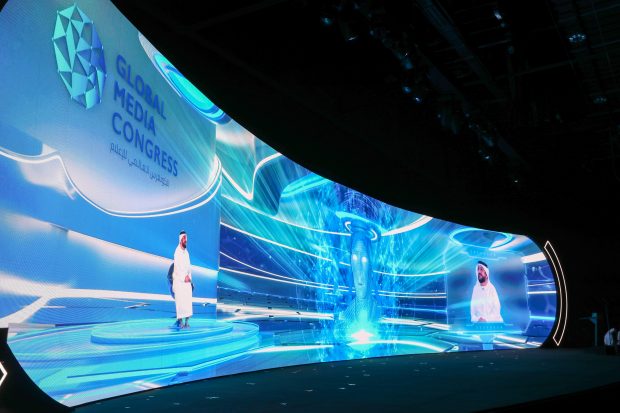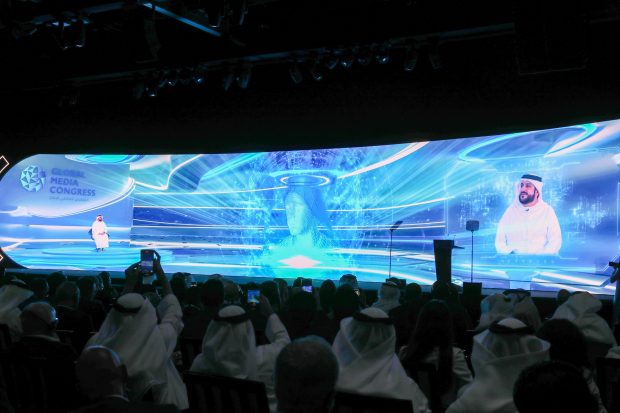At Abu Dhabi’s Global Media Congress, Metaverse presenter conducts live interview
类别: All, Asia, IT·Technology, Media, Science
标签: Global Media Congress, Metaverse presenter

Al Rayssi during the live interview with Hamad, a Metaverse presenter (WAM)
ABU DHABI: An international media event held over three days in the Abu Dhabi, the capital of the United Arab Emirates (UAE), has used technologies that combine physical and virtual reality to conduct a live interview.
The interactive interview was among the major features of the Global Media Congress in its launch edition that brought together media experts, leading companies and international exhibitors.
The interactive interview was by the first Metaverse presenter named “Hamad,” who asked Mohammed Jalal Al Rayssi, Director-General of the Emirates News Agency (WAM) and Chairman of the Higher Organising Committee of the Global Media Congress, questions.
During the interview, Hamad said, “I have always dreamt of combining the physical and virtual worlds and conducting a strategic interview. As the first Metaverse presenter, I am delighted to learn more about the Global Media Congress in my interview with Mr. Mohammed Jalal Al Rayssi.”
The interview is as follows:
Al Rayssi: The idea of the Global Media Congress is based on the UAE’s international responsibility to advance humanity and communities worldwide in all areas, most notably the media sector, which is a crucial driver to achieving prosperity and stability.
The event is unique in the region, as it comprises a conference and an exhibition, gathering specialists and experts in the media sector from around the world.
Hamad: Why have you chosen “Shaping the Future of the Media Industry” as the theme of the first edition of the congress?
Al Rayssi: Because the UAE always aims to serve humanity and harness media and communication technologies to support the international efforts to shape a better future for everyone without discrimination, and because the media sector requires its press, journalism, and TV and radio components to unite in drafting policies and procedures that will ensure credible and accurate news content.
Therefore, shaping the future of the media sector is not limited to one country or region. But it involves all countries because the world is interconnected by many innovations and affected by events happening everywhere.
Hamad: What is the importance of holding the Global Media Congress in a country that hosts many significant events?
Al Rayssi: The Global Media Congress complements the other events and conferences in the country and embodies the message that the UAE aims to deliver to the world by enriching knowledge due to its belief in the importance of strategic cooperation in the media sector.
The UAE also believes in prioritising the exchange of expertise and scientific knowledge among all entities and companies in the media sector covering various categories, including the press, radio, television, and digital and social platforms.
As organisers of the Global Media Congress, we believe in the importance of cooperation and engagement in addressing the political, economic, social and technological challenges resulted in technical developments and smart programmes on the institutional media work system.
Hamad: What will the Global Media Congress add to the media industry?
Al Rayssi: The Global Media Congress will provide an array of benefits to the media industry, including widening the scope of international participation to optimise the benefits offered by all relevant expertise and innovations, linking the global East and West, and learning from the best international practices. It is part of our belief in the importance of collective thinking to create innovative solutions to the modern challenges facing the media sector.
Hamad: What is the Global Media Congress focusing on?
Al Rayssi: The Global Media Congress focuses on a series of main pillars, including panel discussions on the most critical media issues facing the continents of the world, in addition to inventions and innovations in the communication and media sectors and how to harness these to serve humanity around the world.
The international event also focuses on organising professional workshops for a wide range of journalists and media professionals from various continents, as well as improving the capacities of the youth through specialist training programmes covering journalism, radio, television and social communication, along with strategic cooperation and specialist integration through implementing cooperation agreements and Memoranda of Understanding (MoUs) between various media institutions and international companies, in addition to brainstorming sessions linked to the Media Future Lab, through which experts and specialists can discuss current challenges and draft appropriate programmes and initiatives, which will benefit all countries.
Hamad: Why does the event offer various workshops?
Al Rayssi: As the media industry is wide-ranging and diverse, we were keen to offer workshops and training programmes on all specialties, including general workshops and other specialist workshops for journalists, presenters and other media professionals.
The event also provides workshops aimed at sharpening the skills of the youth and building their capacities in various media specialties.

WAM Director General interviewed by a Metaverse presenter (WAM)
Hamad: What can you tell us about the Innovation Platform of the Global Media Congress?
Al Rayssi: The Innovation Platform is the latest invention in the communication and media sector, most notably in terms of communication technologies used to write news stories, edit photos and videos, create sound effects, etc. The platform is important, as it is presented by major media establishments and technology companies.
Hamad: The Media Future Lab will be a private session for several media experts. What are their aims?
Al Rayssi: The main concerns and goals of the experts participating in the Media Future Lab include addressing the contemporary challenges facing the media sector and drafting appropriate international solutions, which are not limited to a single geographical region, because the media sector has many problems on various levels, such as political, economic, social and even psychological issues and their effects on individuals, therefore, requiring collective action that utilise positive thinking to study such problems from all sides, and the launch of joint initiatives that will have a positive international impact.
Hamad: What are the expected outcomes, recommendations and propositions that the event will share with the world?
Al Rayssi: The Global Media Congress aims to establish a positive media discourse and utilise all available means and technological tools to enrich the human experience worldwide by ensuring accurate and credible media content.
The event’s outcomes will be universal, as it will host appropriate programmes that consider the actual needs of workers in the media sector and the future aspirations of the industry.
These outcomes will be formulated in the form of recommendations, international awards, global charters, funded media research and specialist training programmes.



















































